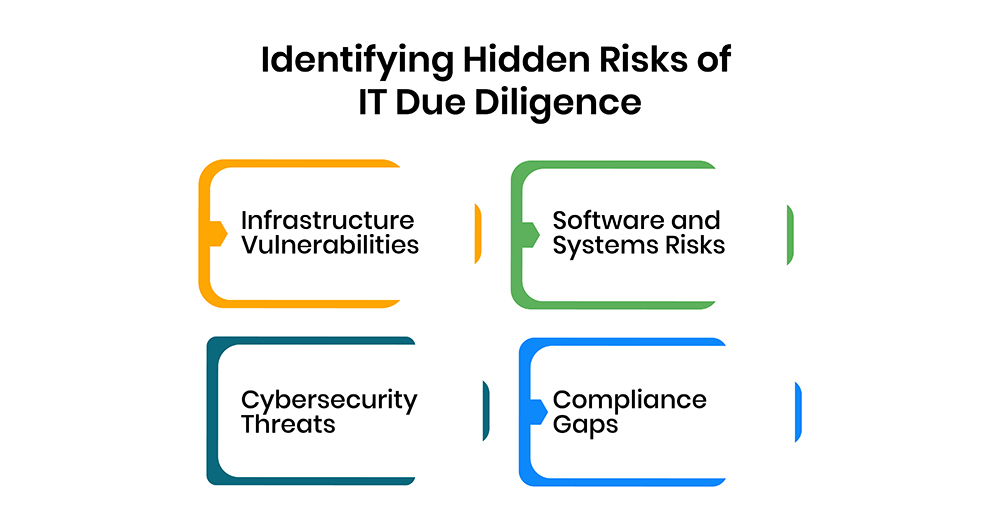Introduction
In the modern investment world, IT due diligence is no longer merely a technology-driven process but a competitive necessity. Since technology now plays a critical role in business; technology due diligence is needed to help pinpoint operational risk issues and potential rewards. As for private equity technology investments, conducting efficient IT due diligence means excluding potential issues and identifying the most suitable ways to create value, making it a critical point of competitive advantage.
Scope of IT Due Diligence
IT due diligence is not just about checklists; it is about exploring every nook and cranny of the target company's technology infrastructure to understand the value and risks associated with an acquisition. This process amplifies the usual corporate investigations— often called due diligence— to concentrate only on IT systems, infrastructures, and digital properties in prospecting a carrier's future development.
Core Components:
-
Infrastructure: Evaluating physical assets, distributed structures, computers, networks, and cloud services that will enable the organization to effectively and efficiently respond to new and dynamic business needs.
-
Software: Assessing the application software environment of own development and third-party to measure the efficiency, security, and adherence with the license terms.
-
Cybersecurity: Assessing the organization's security framework that can be compromised and endanger the security and availability of the data.
-
Scalability: Considering the flexibility of the systems tested during the evaluation, proving whether there is a potential to increase their performance without additional investment.
Technology due diligence also vitally involves ascertaining the extent to which the firm's IT strategy is appropriate for the overall business plan, preventing technology from hindering business progress. Properly assessed areas allow investors to make correct decisions that will create long-term value.
Identifying Hidden Risks: The Crucial Role of IT Due Diligence
IT due diligence has the strategic role of risk identification relating to the non-visibility of certain potential risks that might affect the success of an investment. This entails identifying a firm's primary technological resources and processes including their weaknesses and gaps that may affect value delivery
 Critical aspects of identifying hidden risks include:
Critical aspects of identifying hidden risks include:
-
Infrastructure Vulnerabilities: Old systems are prone to frequent maintenance since their performance degrades significantly, resulting in operational interruptions. Measuring the current hardware status, network systems, and data centers helps determine latent vulnerabilities.
-
Software and Systems Risks: Determining the software's quality, ability, and license is important. The risks hidden in such solutions may include outdated or unsupported software, leading to security vulnerabilities or integration issues.
-
Cybersecurity Threats: An evaluation of the availability of a company's credit security and strength is necessary. The lack of proper cybersecurity measures presents the company's IT systems with risk factors such as data loss, legal sanctions, and brand reputation deterioration.
-
Compliance Gaps: It is important to ensure that a company's IT systems comply with industry regulations and standards. Failure to meet the standards can result in fines and curtailing operations.
When these risks are managed and resolved at the early stages, IT due diligence reduces the chances of future complications in the integration process and lays a more stable foundation for the investment's growth.
Assessing Cybersecurity: Protecting Investments from Digital Threats
In today's world, cyber security is no longer an IT issue but a component of IT due diligence. Evaluating the target company's cybersecurity risk would be instrumental in protecting the investment and guaranteeing value addition.
Key Factors to Evaluate:
-
Data Protection: Self-assessment of protocols for protecting information. Ensure that all data is encrypted, that prevention mechanisms for data loss are in place, and that data is stored securely.
-
Incident Response: Assess the company's contingency plan detailing how to handle unfortunate incidents. This includes evaluating the company's predisposition to cyber threats, readiness to respond to such threats, and capacity to recover from such threats.
-
Compliance: Ensure the company complies with regulations like the General Data Protection Regulation (GDPR), the Health Insurance Portability and Accountability Act (HIPAA), or the California Consumer Privacy Act (CCPA). These frameworks must be followed to avoid legal consequences, financial penalties, and other related issues.
A timely and effective cybersecurity assessment can save thousands and millions of dollars, safeguard ideas and inventions, and ensure customer loyalty. Skipping this aspect of technology due diligence can be a real indicator of likely losses, regulatory organization fines, and harm to the company's reputation.
Moreover, it is crucial to comprehend how a company is liable to specific novel threat types, notably ransomware or advanced persistent threats. Including extensive cybersecurity analyses into information technology due diligence reduces harm's threats while improving the investment's steadiness.
Evaluating IT Infrastructure and Scalability
IT infrastructure and scalability assessment is significant for evaluating the development and effectiveness of the company. This process entails assessing how the existing IT systems can accommodate future growth and changing business requirements. A comprehensive review includes:
-
Infrastructure Assessment: Refurbishment of the current hardware, network, and data centers to accommodate higher workloads and one or more new applications.
-
Scalability Analysis: Review of the measures of the system's flexibility, including its ability to grow or shrink to accommodate business dynamics such as the cloud option.
-
Integration Capabilities: Evaluation of current IT system compatibility with other systems and applications to establish system and data compatibility and coordinate mechanisms.
Lack of assessment may result in difficulties, such as increased costs and work capacity constraints. IT due diligence in this area can not only identify risks but also work to create value since the core purpose of this infrastructure is to support sustainable growth and innovation.
Software and Intellectual Property: Ensuring Legal and Operational Continuity
IT due diligence involves valuing software and Intellectual Property (IP) to ensure no disruption in the legal or operational aspects of the business. This includes an evaluation of all software licenses, IP rights, and patent-related aspects. Validating all software licenses helps avoid any legal issues and also ensures that all licenses and other legal documents are well attached to avoid future problems after the acquisition.
-
Software Licensing: Check if the target company's software is legal. This entails examining licensing practices and assessing infringement risks, which are always costly legal concerns.
-
Intellectual Property Rights: Review the ownership and safeguarding of the company's assets, such as patents, trademarks, and copyrights. Ensure that such rights are well stated and that the company owns the rights for those technologies that will define it.
-
Patent Issues: Assess patents in place and those under application to determine their relevance in future operations. Ensure that there are no legal tussles that may lower the worth of the IP portfolio.
Proper assessment in these areas not only protects the buyer from legal and operational liabilities but also increases the acquisition's strategic worth, guaranteeing that the target company's technological assets are safe and relevant.
The Intersection of IT Due Diligence and Private Equity Technology Strategies
The application of IT due diligence in private equity technology is essential for ensuring that technology supports investment goals. Since technology companies are becoming the major focus of private equity firms, IT due diligence is no longer limited to evaluating risks; it also serves as a value-adding process.
-
Strategic Alignment: IT due diligence assists in determining how effectively the target company's IT systems support the private equity firm's strategic objectives. This involves assessing the capacity of the existing technology infrastructure to accommodate the anticipated expansion strategies or whether a complete overhaul of the existing technology will be required.
-
Operational Efficiency: This type of IT due diligence can also help identify areas where the company can improve the effectiveness of its operations by leveraging technology. This could include streamlining duplicate systems, integrating previously disparate functions, or implementing cloud technologies to save money.
-
Competitive Advantage: IT due diligence involves a thorough analysis of the technological environment, which can reveal opportunities to use a company's IT resources to gain a competitive advantage. This includes the ability to use technology as a tool for innovation, for instance, by embracing AI or advanced analytics.
-
Long-term Investment Goals: By integrating IT capabilities with long-term investment strategies, it is possible to ensure that investments in technology are directed towards sustainable development. IT due diligence enables identifying the right areas to invest in to support future business growth.
Conclusion
Conducting comprehensive IT due diligence when investing in private equity technology is crucial, as potential pitfalls need to be revealed, and value needs to be unlocked. Organizations can accelerate growth through IT systems strategies, strengthen competitive positions, and ensure successful post-merger integration. Therefore, more emphasis must be put on technology due diligence as technology progresses to achieve long-term benefits and stay ahead of the competitors in the market.



 Critical aspects of identifying hidden risks include:
Critical aspects of identifying hidden risks include:



